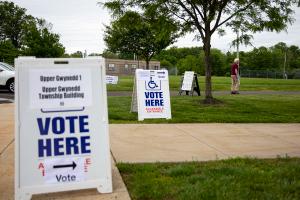This article is made possible through Votebeat, a nonpartisan reporting project covering local election integrity and voting access. This article is available for reprint under the terms of Votebeat’s republishing policy.
HARRISBURG — The Pennsylvania House passed an election overhaul bill Tuesday that creates stricter voter ID requirements and early voting in 2025, despite opposition from most Democrats and a promised veto from Gov. Tom Wolf.
The state Senate is poised to take up the measure in the coming days, but Republican lawmakers in the chamber are charting a separate path that would advance the priorities of county election officials while putting stricter voter ID requirements on a future ballot.
The topic has emerged as a partisan sticking point in Harrisburg. Currently, only first-time voters and those casting ballots at a new polling precinct are required to show ID. Roughly three-quarters of respondents to a recent Franklin & Marshall College poll of Pennsylvania voters said they favor requiring all voters to show photo ID.
Democrats call any new such ID restrictions “voter suppression,” while Republicans say it makes elections more secure. The reality is more complicated, with a 2019 study showing such laws don’t reduce already-rare fraud or voter turnout.
House lawmakers spent more than three hours Tuesday debating Rep. Seth Grove’s 150-page election bill, which also places limits on drop boxes; requires more comprehensive audits of ballots, machines, and processes; and calls for the state to reimburse each county for electronic poll books.
Grove, who heads the House committee in charge of considering election legislation, said the measure secures and modernizes elections while ensuring access to voters. The bill was drafted without input from Democrats.
Democrats countered that most of what’s included in Grove’s bill isn’t necessary and addresses false claims of voter fraud rather than expanding voter access. Rep. Margo Davidson (D., Delaware), the minority chair of the House State Government Committee, called the bill “another sad step in the march that is dismantling our democracy.”
Wolf on Twitter said he wants election reform, but would veto Grove’s bill in its current form.
“The lawmakers behind this bill are the same ones who asked Congress to throw out PA votes and whose lies directly contributed to the Jan. 6 insurrection,” he tweeted Tuesday.
A state Senate committee is expected to consider the legislation in the coming days.
Even within the GOP, there appears to be disagreements over how to approach any overhaul of the Election Code, with its right-wing members favoring a wholesale repeal of mail voting and a third, Arizona-style audit of the 2020 election.
Argall supports such a review, despite two already-completed audits and multiple government officials confirming the accuracy of the votes.
Grove has rejected an audit and said his focus is on passing the omnibus election bill, which he said was a result of 10 hearings aimed at finding ways to restore confidence in elections. He said he’s tried asking Wolf to negotiate without success and dismissed Democrats’ claims of voter suppression as a “false narrative.”
His counterpart in the Senate State Government Committee, David Argall of Schuylkill County, is taking a different approach that may prove more successful.
The Republican senator is pushing a bill that solely addresses two priorities county commissioners and election officials fiercely advocated for in the months leading up to the 2020 presidential contest: moving the deadline to apply for a mail ballot from seven to 15 days before Election Day, and allowing county officials to begin processing, or “pre-canvassing,” mail ballots seven days before Election Day.
Argall’s piecemeal approach to election reform is likely to be supported by Democrats and Wolf, who have repeatedly said changes requested by election officials should be addressed before the legislature tackles more nuanced issues. The bill has yet to be considered by Argall’s committee.
“If your car needs new tires and brakes to pass inspection, that’s what we ought to do,” Rep. Mark Longietti (D., Mercer) said Monday. “Some folks want to rebuild the entire car, which takes a lot of time, that’s a big project, and we don’t have the tools to do that because the governor doesn’t support that.”
At the same time, Argall’s committee has advanced a proposed constitutional amendment to require voter ID, though the measure is light on details. The proposal has a major benefit for the GOP: It wouldn’t require support from Wolf, who has vowed to veto any legislation with stricter ID requirements.
The full state Senate could take up the resolution as early as this week before sending it to the House. As a constitutional amendment, lawmakers would need to approve the measure in two consecutive two-year sessions, meaning the earliest voters could see the question is 2023.
Republicans used the amendment process to send two questions about curtailing the governor’s emergency powers to the voters, who approved the changes to the Pennsylvania Constitution this May. Such amendments rarely fail to pass: Since the 1990s, voters have approved 100% of ballot questions.
WHILE YOU’RE HERE… If you learned something from this story, pay it forward and become a member of Spotlight PA so someone else can in the future at spotlightpa.org/donate. Spotlight PA is funded by foundations and readers like you who are committed to accountability journalism that gets results.
